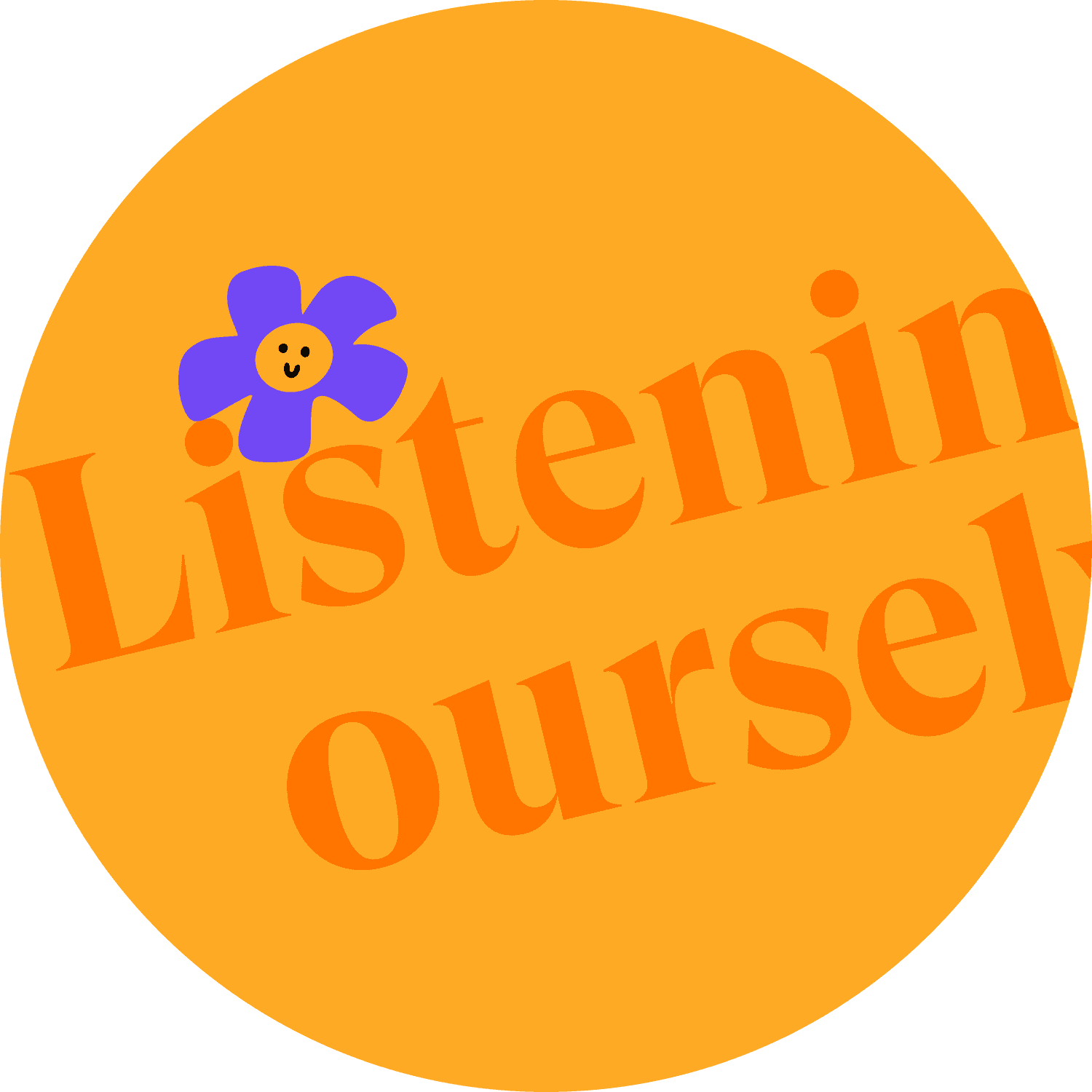
Farmers’ markets are places for purchasing local produce, and where producers can connect directly with those who eat their food. But how exactly does this differ from a regular market? Why should we shop at them, and can we really afford to do so? How can they be found? And what should we expect from one anyway?
Read on, as we provide answers to these common questions.
How Do Farmers’ Markets Differ from Regular Markets?
The difference is simple: a regular market is a collection of stalls run by distributors. Often, they may have no idea where the produce they sell originates.
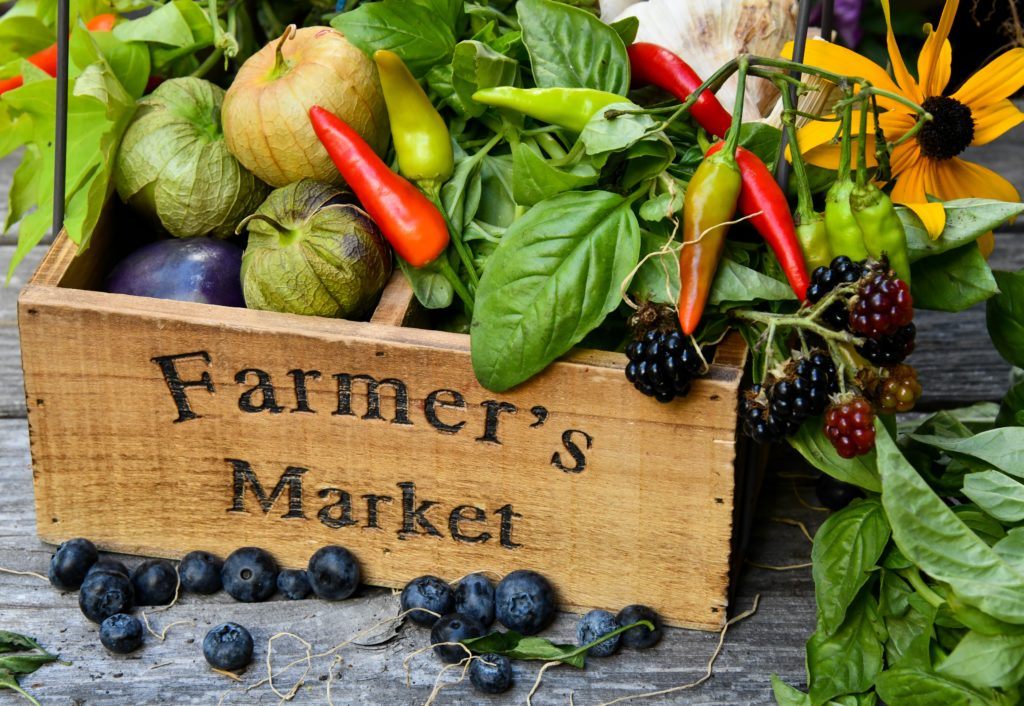
Stalls at a farmers’ market, on the other hand, are operated by people who can tell you all about the products on sale and exactly where they came from. Often, those doing the selling – who are usually very local – actually grew the crops, reared the livestock, or made the products on display.
Why Farmers’ Markets are Good for Ethical Shoppers
In the modern world, there is often a disconnect between food production and those who eat the end result. Many people have little regard for the origins of what they eat, meaning they do not think about its true cost – not only financially, but also in terms of people, and the planet.
By contrast, farmers’ markets have greater transparency and a much shorter chain between food production and consumer, making them a more ethical choice for shoppers.
Whenever we put anything on our plates, or into our mouths, we should think about:
- The carbon cost of both growing the food and transporting it to us.
- The overall environmental impact of the growing system or form of agriculture employed.
- The human cost of food growth and production.
Problems with the Current Food System
The current agricultural and food production system is broken; we urgently need to create sustainable change in this area. Fixing the disconnect between producers and consumers is just one part of the puzzle, but shopping at farmers’ markets is a beneficial change.
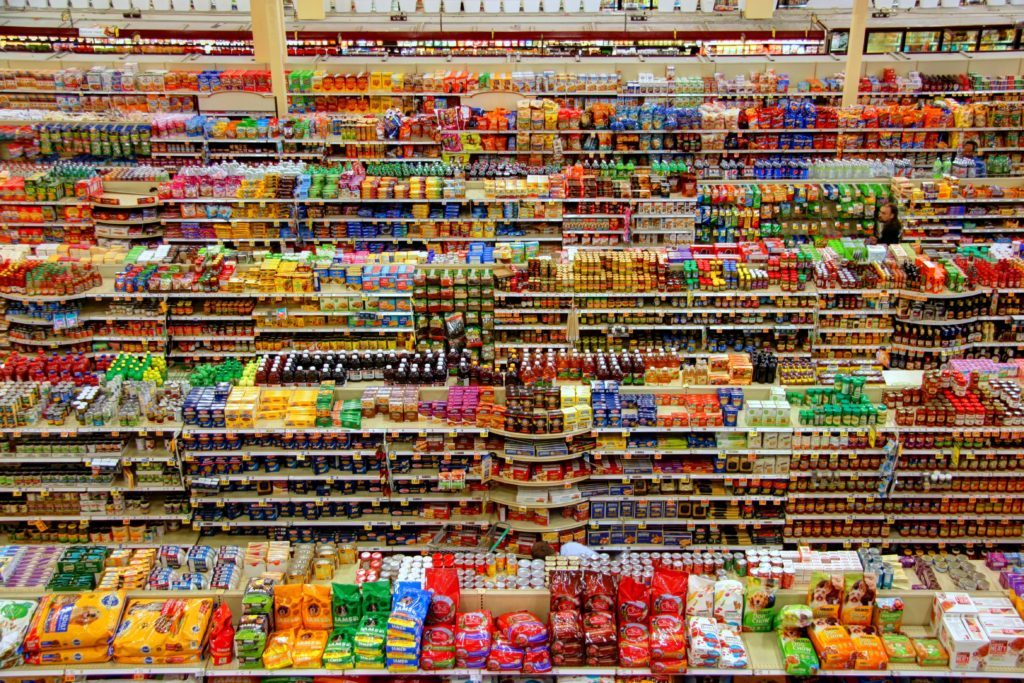
It is important to fully understand the problems we face, so, what is wrong with the food system as it currently stands? Here are some of the main issues:
- Much of our food is not grown locally, but instead transported great distances around the world.
- Consumers are disconnected from the seasons, demanding produce that must be grown abroad, or in hothouses which guzzle energy (not usually from renewable sources).
- Non-organic, mono-crop agriculture damages soil, as well as using harmful pesticides and herbicides that pollute the environment and disrupt the wild food chain. If we do not change our approach, the topsoil essential for food production could be gone in as little as 60 years.
- There is little to no transparency in food supply chains, meaning it is often difficult to determine where food has actually come from, and where and how it has been grown.
- Supermarkets put a strangle-hold on the industry, dragging down prices and making difficulties for farmers and producers.
- Food is often packaged in unnecessary plastic or other non-sustainable packaging – posing a waste problem of massive proportions.
How Shopping at Farmers’ Markets Can Help
Farmers’ markets allow us to buy local, seasonal, and – ideally – organic, sustainably-produced fresh produce, and food and drink products. This enables us to withdraw support for damaging systems, to avoid supermarkets, and move closer to a truly sustainable and ethical diet.
We all have a fundamental entitlement to food, which would ideally be enshrined as a basic right informing government policy. Yet, at present, this is not the case. Transparency in food production is key to empowering people and affirming their right to healthy, good-quality food. Shopping at farmers’ markets can help strengthen resilient and transparent local food supply systems.
Buying loose produce at a farmers’ market can often also help us reduce plastic waste too, since a growing number of market sellers choose to wrap or package goods in more sustainable ways.
The Personal Benefits of Shopping at Farmers’ Markets
Shopping in this way not only reduces our negative impact on the environment and other people: it can also bring a range of personal benefits. Access to fresh, local, and organic produce means eating more healthily, avoiding harm to your health from overly processed goods, junk food, and harmful chemicals.
What’s more, shopping at farmers’ markets can provide enjoyable new experiences. Even when only buying a few items, it can be great fun to see the different products on display, and meet the people who produce them. The experience is not just about shopping: it can be a social one too. And if you live in a city, speaking with farmers and rural producers can be a great way to gain insight into different ways of life.
How Farmers’ Markets Help Farmers and Growers
Remember, shopping at farmers’ markets can help farmers and growers too. Buying their wares directly means supporting them by making sure money goes into their hands, rather than those of middle-men and big business.
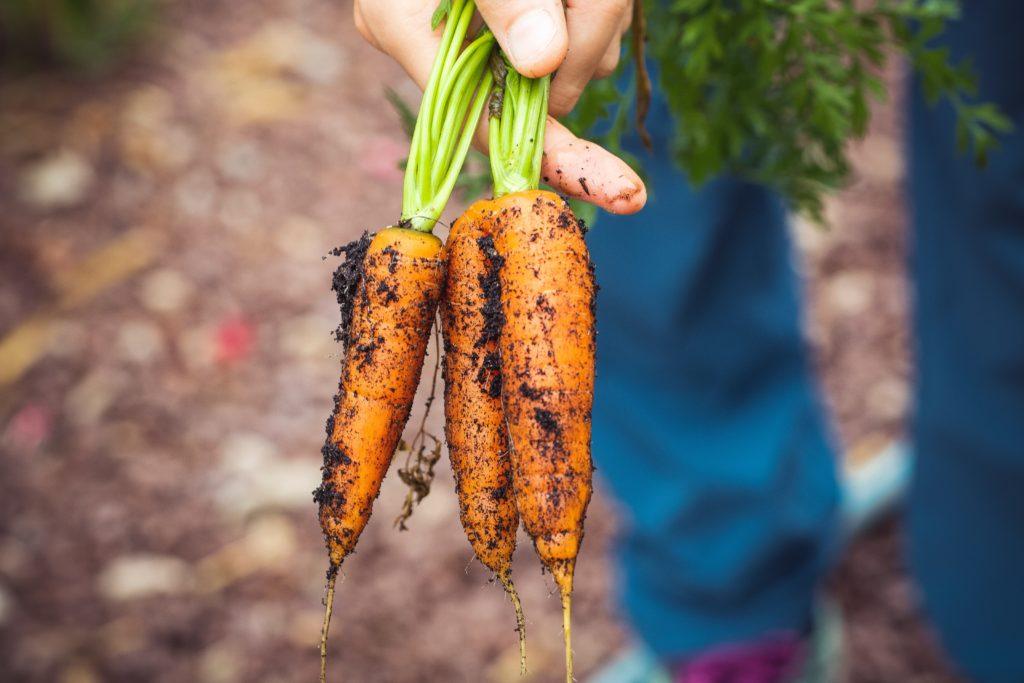
For farmers and producers, the opportunity to sell their wares through one of these markets can be a godsend. A market stall can allow them to:
- Sell smaller quantities. (Great for smaller community growers, farms, and businesses, who cannot upscale to supermarket or wholesale selling.)
- Avoid distributors who take a cut of the profits.
- Sell directly, seeing customers face-to-face, giving an opportunity to explain what they do, and the benefits of their food and methods firsthand.
- Learn from their customers and sales what works and what doesn’t, in order to optimise business plans and strategy.
- Find a new revenue stream and diversify their business.
- Forge connections with the wider community, away from their farm or home. Farming and food production can often be a lonely and isolating business, so market stalls offer the chance for pleasant social interactions, as well as commerce.
How to Find a Local Farmers’ Market
By now, you may be champing at the bit to find a farmers’ market near where you live – but how?
Farmers’ markets often take place only on particular days, likely once or twice a month. They may be held at a traditional marketplace, or take place elsewhere, indoors or outside.
Here 👇 are some resources to help you find local farmers’ markets in the UK:
Farm Retail Association Markets Map
Can I Afford to Shop at a Farmers’ Market?
The benefits of farmers’ markets are inarguable, but their prices can be a shock compared to supermarket pricing. However, it is important to remember that these prices better reflect the true costs of production, whereas supermarket pricing simply isn’t sustainable for many farmers – the reason so many struggle, and why many ultimately go out of business.
Though you may pay more at a farmers’ market, as with most things, you really do get what you pay for. You may be paying a premium, but you are paying it to benefit farmers, the planet, and its people. Organic produce is more expensive, but consider how much we are all truly saving; spending a little extra is a small price to pay considering what is at stake if we don’t all start eating more sustainably.
Saving Money at the Farmers’ Market
There are also ways to save money at the market. For example:
- Make a budget, so you know beforehand how much you have available to spend.
- Shop with a list, and have a meal-plan in mind; this will help avoid wasting food, but also consider preserving fresh food and making full use of leftovers.
- Be prepared to change your plans if you find a great deal.
- Make sure you have a plan in place to avoid wasting food once you get it home, preserve fresh food, and make full use of leftovers.
- Buy fresh produce rather than processed goods when it is possible to process them at home. (For example, buy strawberries or other fresh fruit and make your own jam, rather than buying jars from the market.)
- Examine every stall and speak to stallholders throughout the whole market before committing to buying anything; different stalls may offer the same produce at different prices.
- Haggle. This is expected and it is possible to knock down prices, especially later in the day, when stallholders want to sell off their goods before leaving.
What to Expect from a Farmers’ Market
If you have never been to a farmers’ market before, you may wonder what to expect. What might you find there?
Here are some examples of the types of food and drink that the stalls themselves might sell:
- Fresh local produce like fruit, vegetables, and herbs.
- Free-range eggs, organic milk, cheese, and other sustainable dairy products.
- Sustainable, farm-raised meat and meat products.
- Local honey and related products.
- Locally grown (or commercially foraged) mushrooms and products made from them.
- Artisan bread, cakes, and other baked goods (often made using locally milled flour).
- Jam, chutneys, and other locally-made preserves.
- Other sustainable processed foods such as crisps, dried fruits, cereal mixes, etc.
- Locally produced fresh-fruit juices and other sustainable soft drinks.
- Local organic wines, craft beers, and spirits.
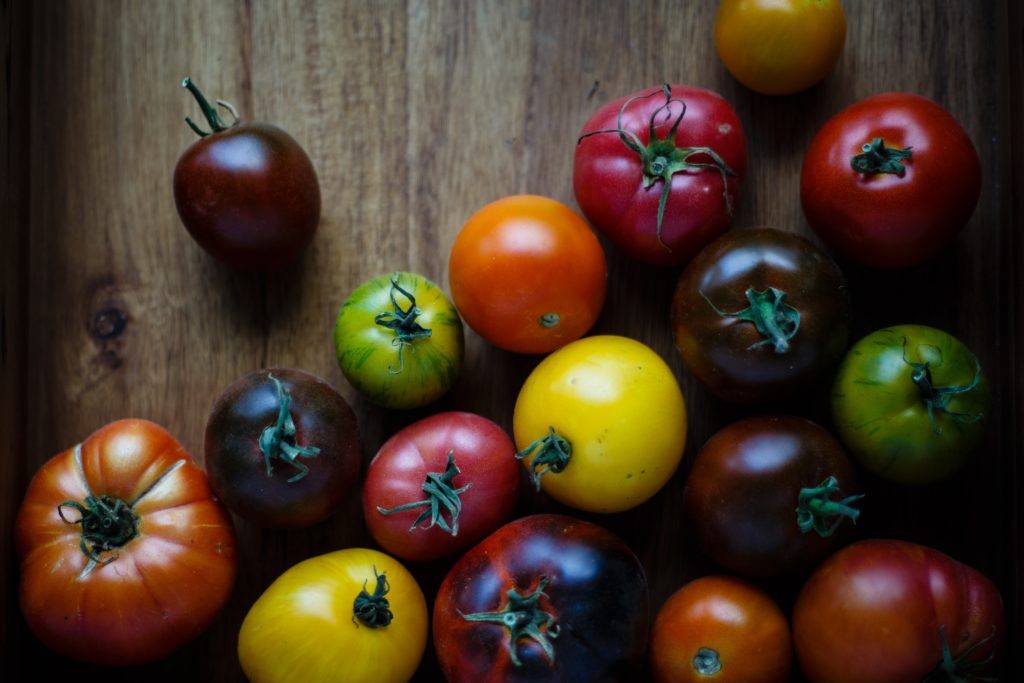
Of course, what you find will depend on local producers and what exactly is grown and made in your area. You may also come across more unusual products from up-and-coming new producers; you never know quite what you may find.
Other stalls may sell food for immediate consumption, such as:
- Burgers, fish and chips, toasties, vegan or veggie street food, or other local-produce fast food.
- Ice-creams, sometimes made with goats milk, or otherwise atypical.
- Pop-up coffee shops or tea rooms.
If you are a foodie, visiting a farmer’s market will often leave you in seventh heaven, but though mostly dedicated to food, some stalls may offer other sustainable products, for example:
- Local artists’ work.
- Traditional crafts such as knitting, sewing, pottery, basketry, or greenwood furniture.
- Natural cleaning and beauty products, such as handmade soaps.
In addition to buying things, there are often additional enticements to draw in the crowds, like cookery or craft demonstrations, or performances by musicians or other performers..
Each market is different, so you will have to head along to see for yourself and what’s on offer.
What to Look for in Local Food and Drink
When choosing food and drink or other items from a farmers’ market, there are a lot of considerations. You may be used to selecting what you buy largely on the basis of price, but when shopping carefully and sustainably, other elements come into play.
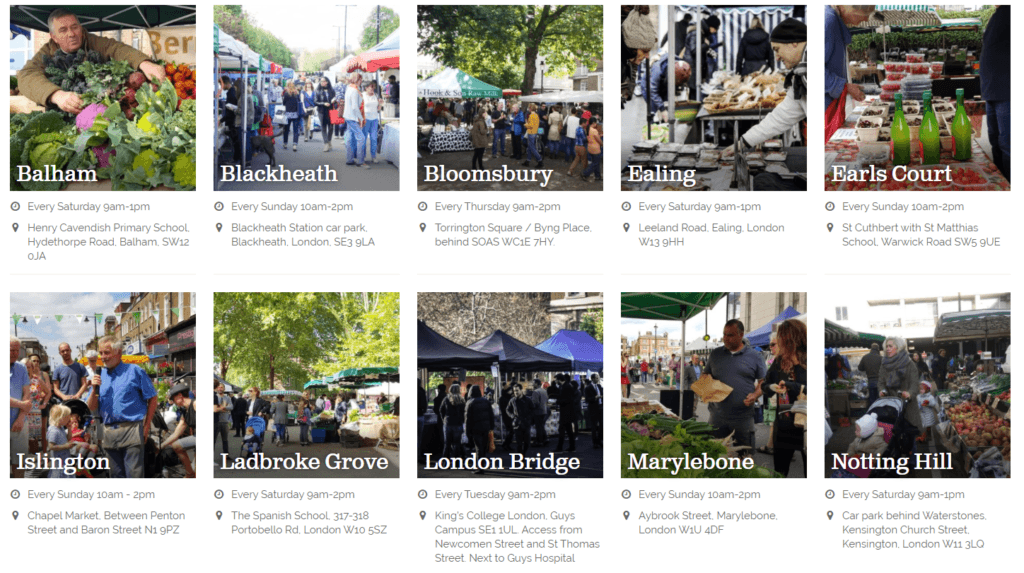
As mentioned above, the most affordable farmers’ market goods are the unprocessed, fresh items. Firstly, try to ensure that your choices are fresh, local, sustainably produced, and, ideally, organic.
👉 Fresh fruit and vegetables at a farmers’ market are often rather different to those in supermarkets: they may be covered in dirt, or have less homogenous appearances. But don’t be put off; as long as they look healthy, with no rot or disease, they will be wonderful. Often, they will have far more flavour than supermarkets’ bland and frequently non-organic produce – a reminder that ‘perfection’ doesn’t necessarily denote quality. Some fruit and vegetables are tastier and more nutritious in spite of their blemishes.
A major element of shopping at farmers’ markets is speaking to growers and producers. The more you interact with stallholders, the more you will see the benefits of what they do, and want to be even a small part of it.
How Else to Access Sustainable Produce from Local Producers
Farmers’ markets are wonderful – but they are not available every day. Fortunately, a number of other options allow access to sustainable produce from local producers.
Farm Shops
The first potential alternative is to visit a permanent farm shop; if the farmer doesn’t come to you, you can go to them.
Farm shops are usually located on or very close to the farms themselves. If you live in a city, you may have to travel a little distance out of it to reach a farm shop, but when you do, you will often find many of the same products as at a farmers’ market.
Farmers often set up farm shops in order to sell directly to customers year round without worries about distribution, and without having to wait for market day to come around. Some farm shops also have a café or even a restaurant attached, where produce and products from the farm can be enjoyed.
To find farm shops close to you, check out these 👇 links:
🌱 Farm Retail Association Member Farm Shops Across the UK
Pick-Your-Own and Farm Stands
A growing number of farms without shops on the premises instead offer visitors the chance to pick up produce from a farm stand, or even to pick their own.
Farm stands are often located at a car park or parking area by the side of a road, and frequently take payment through money deposited in honesty boxes. Pick-your-own farms and orchards allow you to harvest your own produce from the ground or off the living plant. Picking your own can sometimes be a little cheaper than buying the same produce from a market or farm shop – and you can not only see exactly where the produce comes from, but also have an enjoyably fun day out.
👉 Here is a link to a number of UK farm stands and pick-your-own sites: Farm Stands and Pick Your Own Listings
Local Food Hubs
The concept of local food hubs is an important one for improving the sustainability of current food systems. Farmers’ markets and farm shops can be food hubs, but there are also increasingly a range of other types.
Food hubs are entities that link growers and producers with consumers, by gathering growers’ food and distributing it either to commercial customers or directly to consumers. They often focus on helping small-scale growers and producers find markets, and fill gaps in local food infrastructure, making it easier for communities to find sustainable local produce.
Different types of ethical food hub include:
- Social supermarkets or co-op grocery stores.
- Business development support facilities: incubators for food and drink entrepreneurs.
- Educational facilities teaching people about food, growing, and cooking.
- Sites for the collection and distribution of food aid
- Spaces for community food engagement, such as community larders, community cafes, or spaces for communal eating and shared meals made with local food.
All sorts of different food hubs could help you get your hands on fresh, local, sustainable food, and to contribute to a better and more ethical food future.
Veg Box Deliveries
Perhaps the easiest way of all to purchase fresh, local, seasonal, organic produce is to have it delivered to your door. A number of farms around the UK offer this service, with some even offering nationwide delivery of not only fresh fruits and vegetables but also often organic meat, fish, and dairy, and artisan breads. Here are a few nationwide examples:
- Riverford Organic Farmers
- The Nutritional Organic Food Co.
- Macleod Organics
- Piktfresh
- Eversfield Organic
- Abel & Cole (England and Wales only)
You may also find veg box producers operating in your specific local area. Choosing a veg box delivery from a farm as close to home as possible is a great way to eat more sustainably.

To find a nearby organic veg box delivery scheme, choose the closest from this list of providers on the Soil Association website.
Eating fresh, local, organic food is easier and more affordable than you might imagine. So before your next supermarket visit, seek out other options such as farmers’ markets, farm shops, or other farm outlets, food hubs, or veg boxes. Think about making a more sustainable choice.
Earth.fm is a completely free streaming service of 1000+ nature sounds from around the world, offering natural soundscapes and guided meditations for people who wish to listen to nature, relax, and become more connected. Launched in 2022, Earth.fm is a non-profit and a 1% for the Planet Environmental Partner.
Check out our recordings of nature ambience from sound recordists and artists spanning the globe, our thematic playlists of immersive soundscapes and our Wind Is the Original Radio podcast.
You can join the Earth.fm family by signing up for our newsletter of weekly inspiration for your precious ears, or become a member to enjoy the extra Earth.fm features and goodies and support us on our mission.
Subscription fees contribute to growing our library of authentic nature sounds, research into topics like noise pollution and the connection between nature and mental wellbeing, as well as funding grants that support emerging nature sound recordists from underprivileged communities.
